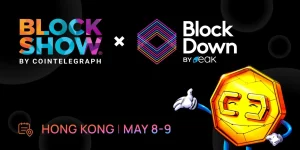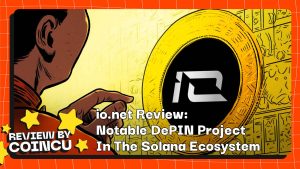In 2023, cryptocurrencies did significantly well. DeFi, Layer 2, and Web3 platforms are driving current developments. Their novel developer and staking node design provide the required security and incentives for smooth Web3 development. Ankr’s mission is to give PoS projects with multi-chain tools to create quickly, cheaply, and reliably, fueled by its main utility token, ANKR. Let’s learn details about this project with Coincu through this Ankr Review article.
What is Ankr?
The Ankr network is a platform that allows Web3 applications to connect to a decentralized node infrastructure and construct using a sophisticated set of tools.
Chandler Song and Ryan Fang developed Ankr in 2017, with a mainnet launch planned for 2019. It provides a set of Web3 tools that allow developers, apps, and stakeholders to access the infrastructure of various blockchains from a single decentralized platform.
Anybody may run an Ankr Protocol node and receive incentives for servicing requests to blockchains all around the globe. Developers and projects who do not wish to build up and manage their own nodes, on the other hand, may pay to use the Ankr Protocol’s decentralized node infrastructure. Ankr may also be used by users who desire to stake or become validators across many blockchains.
The Ankr platform swiftly turned its attention to giving developers a decentralized web3 infrastructure as a crypto solution. Ankr has become a vital connection between top blockchains like Polygon, Arbitrum, Avalanche, Near, and many more.
Free RPC services, complex APIs, gaming SDKs, a multi-chain blockchain explorer, and enterprise-grade node solutions are among its creative goods.
The Ankr team is on pace to completely decentralize its governance and infrastructure in order to facilitate and accelerate Web3 development.
Its blooming ecosystem promises to generate acceptable use cases for ANKR, its native token, as projects adopt blockchain technology through Web3 apps. Now, the Ankr Review article will explore how the project works.
How it works
To run its decentralized design, the Ankr network employs a complex interplay of smart contracts, consensus procedures, and cryptography. Its distributed architecture includes Remote Procedure Call (RPC) services that are highly available and scalable.
Decentralized node services
From DeFi and NFTs to the metaverse and GameFi, nodes power the web3 economy. Ankr runs a distributed node service that allows developers to connect to public endpoints for free.
DeFi platforms, NFT ventures, blockchain games, and dApps of all types benefit from Ankr’s decentralized infrastructure. With so many high-performance independent nodes servicing requests all across the globe, all of these apps will have quicker, more scalable, and more cheap access to blockchains.
Caching is used by the Ankr network to handle RPC requests rapidly and save protocol resources. Ankr’s decentralized node network guarantees its customers better latency and more efficiency while developing.
Its incentivized node economy consists of its own nodes as well as a consistent, self-sustaining supply of independent node providers eager to meet the high demand for requests from developers and stakeholders.
Putting up a blockchain node takes technical expertise, as well as time and effort. Not everyone is equipped to handle node deployment on their own. Ankr may launch a dedicated node for you to access remotely if you need one. Ankr Protocol is made up of autonomously running nodes all over the globe from which you may request data at any moment.
The load balancer lies at the core of Ankr’s node design. When an RPC request is received on Ankr, it is routed via the load balancer before being allocated to random nodes. The load balancer then uses a scoring mechanism to decide which node is best suited to handle the request.
The load balancer utilizes a scoring system to determine if nodes are synchronized to blockchains or behind blocks to guarantee node health. In addition, the balancer links the user to the fastest node based on geographical location.
Premium API and RPC endpoints
Developers that want to deploy smart contracts and dApps on a blockchain must use specialized APIs (Application Programming Interfaces).
Nevertheless, this usually necessitates operating your own node and spending hours syncing it to the current state of the blockchain.
By offering rapid API services and RPC access via their network of decentralized node providers, Ankr Protocol eliminates the need to host your own nodes altogether.
Since you and your project have dedicated APIs and Remote Procedure Calls (RPCs), you and your project may interact with blockchains without competing traffic from other users on shared servers.
You may retrieve the whole chain’s data by utilizing an API endpoint at Ankr without having to perform any setup work yourself. The API will provide your dApp with all of the information it needs to work smoothly and provide a better user experience.
Ankr provides a sophisticated developer API service. The network’s application programming interfaces (APIs) make it easier to query data from numerous blockchains. By accessing numerous chains at once, these time-saving APIs decrease the number of calls that a developer must perform.
Ankr Protocol has released three advanced APIs for developers, which are shown below.
Query API
Instead of manually searching for addresses and events using RPCs, this API searches Ankr’s database for a range of blocks. As a blockchain generates a new block, it is uploaded to a database, allowing queries to be answered instantly. For increased performance, the query API is SDK-enabled and indexed.
NFT API
NFTs are an essential component of web3. As a result, developers need tools to assist them in working with NFTs. The Ankr NFT API enables developers to swiftly search for information about NFTs across the API’s six linked blockchains. Developers may learn about the owner of an NFT, when it was created, its transaction history, and much more.
Token API
Developers may use the token API to quickly get information about tokens on Ankr’s EVM-compatible blockchains. Users may get information like token account balances, current market value, and the total amount of tokens on a certain blockchain.
Liquid staking
The Ankr liquid staking solution allows integrators and stakers to stake and profit from blockchains in a variety of ways.
Staking often entails locking up your tokens for a period of time during which they cannot be utilized. Crypto investors may use liquid staking to stake their assets on Ankr and obtain liquid staking tokens to access a variety of DeFi options.
Liquid staking tokens may be used to provide liquidity to blockchains while also earning passive revenue from trading fees. You may also utilize them to gain agricultural rewards, as collateral for borrowing, or as compounding returns in a vault.
To begin staking, you must first link your wallet to the site. Ankr supports a variety of wallets since it allows you to stake various coins.
Since Ankr’s liquid staking shifts the responsibility of staking to validators on supported blockchains, you may perform delegated staking on blockchains that do not use the liquid proof of stake (LPoS) method. Although Ethereum 2.0 is built on PoS validation, it does not natively enable delegated staking. Ankr allows you to delegate your cash to a complete Ankr node on Ethereum 2.0 in order to collect incentives.
Enterprise
For enterprises that demand flexible, customized solutions, Ankr provides a Web3 Infrastructure-as-a-Service approach.
Companies interacting with numerous blockchain networks may take use of Ankr’s API and RPC services, which are available through a monitoring platform.
Since corporate demands vary from those of smaller projects, dApps, and users, this enterprise solution focuses on commercial use cases.
ANKR token
ANKR, the updated Ankr platform’s native token, is an ERC-20 and BEP-20 token that can be used on both Ethereum and the BNB Chain. The token’s usefulness is centered on the building of a decentralized marketplace to support Web3 development.
The Ankr network’s upgrade to Version 2.0 has increased the usefulness of ANKR tokens. The ANKR token has a maximum quantity of 10,000,000,000 and is essential to Ankr Protocol’s decentralized infrastructure marketplace.
One of the most common uses for ANKR tokens is to pay network usage fees. Ankr offers a premium plan package for developers that is pay-as-you-go.
Customers may purchase the plan using “credits” or ANKR tokens. Individuals who purchase using ANKR tokens enjoy a discount.
Another use for ANKR is the provision of collateral deposits in order to become an independent node provider on the network. To be eligible, each node must self-stake 100,000 ANKR tokens. Self-staking works as an insurance policy to ensure that node suppliers meet the protocol’s high uptime requirements.
ANKR token holders may also delegate part of their tokens to node providers and share in the benefits.
The tokens may also be used to reward Ankr’s global independent node operators. The benefits are proportional to the volume of traffic served by the operator. As a result, the best-performing node operator earns the most ANKR tokens.
Regular audits are required to guarantee that independent node suppliers maintain good standards. Ankr will collaborate with partners to conduct out audits in exchange for ANKR tokens.
Finally, owning ANKR tokens grants you voting rights on Ankr DAO. Token holders may influence network governance by donating tokens to a voting contract.
The token, which has a maximum quantity of 10,000,000,000, is essential in Ankr Protocol’s decentralized infrastructure marketplace.
As a result, ANKR may be utilized inside the Ankr network as both a utility token and a governance token.
ANKR is a payment mechanism for all Ankr goods and an important component of the protocol for users, suppliers, and stakeholders. As a result, ANKR is more akin to PancakeSwap’s CAKE than to native tokens with their own networks, such as BTC or ETH.
Does Ankr have potential?
Ankr’s transition into the provision of a Web3 infrastructure is a strategic move for the network. There’s an ever-increasing demand for Web3 applications as more people and enterprises embrace the third-generation web movement.
The protocol’s suite of products, including its RPC services and advanced developer APIs, is critical for web3 growth. According to the project white paper, the network’s public RPCs are catering to over 7.2 billion daily requests to blockchains, with the number expected to grow over time.
Conclusion of Ankr Review
The Web3 movement is increasing by the day, and Ankr has built a robust infrastructure to enable blockchains that want to migrate to the third-generation web. The protocol is rapidly expanding as one of the primary participants in the web3 node service area.
We can anticipate additional blockchains to depend on Ankr to deliver efficient, inexpensive, and decentralized node services as blockchains and Web3 infrastructure increase and become more complex. The protocol provides something for everyone, whether you’re a developer or a crypto investor.
Ankr has established itself as one of the fastest-growing suppliers of decentralized infrastructure, and it is constantly adding new services for Web3 developers and consumers. Hopefully the Ankr Review article has helped you understand more about the project.
DISCLAIMER: The Information on this website is provided as general market commentary and does not constitute investment advice. We encourage you to do your own research before investing.
Join us to keep track of news: https://linktr.ee/coincu
Harold
Coincu News























